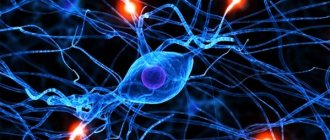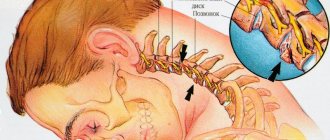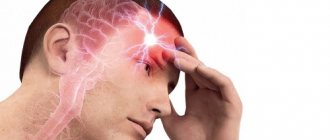Author's rating
Author of the article
Smirnova Olga Leonidovna
Neurologist, education: First Moscow State Medical University named after I.M. Sechenov. Work experience 20 years.
Articles written
94
It often happens that a person experiences dizziness while lying down. Most often, this symptom is accompanied by weakness and back pain, and the latter becomes regular. Sometimes a person may experience numbness in their arms or legs. Any of these symptoms in itself is a reason to undergo a full medical examination, because most often their cause may be problems with the spine, heart or internal organs. It happens that vertigo bothers you even during sleep. Let's figure it all out.
If you feel dizzy when turning your neck
In the medical literature, dizziness is called vertigo. With it, a person feels as if everything is rotating along a closed trajectory, and there is a feeling of the earth disappearing from under one’s feet.
The easiest way to intentionally induce this state is to ride a carousel. Of course, feeling vertigo is not pleasant. In addition to the feeling of rotation, nausea often appears, and thoughts are confused.
By the way, some people with a well-developed vestibular system will either not experience dizziness after riding a carousel, or it will be mild.
The culprit of vertigo when turning the neck may be the following:
- Vertebral artery syndrome. Brain tissue needs a constant and very strong blood flow. The brain is quite “gluttonous” in this regard. Therefore, blood is supplied to him by as many as three arteries.
The carotid artery does most of the work. But it is the two vertebral arteries that supply the cerebellum, which is responsible for coordination.
Therefore, when turning the head sharply, there is a high risk of short-term hypoxia, that is, the cerebellum will temporarily lack blood, because the arteries are pinched. Dizziness appears, sometimes it can become dark in the eyes, there will be a feeling of tightness in the head, pain in the back of the head.
Doctors note that vertebral artery syndrome occurs in almost all people. It can even occur when a person simply turns his head sharply on the pillow while sleeping. He wakes up and feels dizzy.
Some mistakenly believe that it was caused by restless dreams that caused nervous tension and awakening. If dizziness often wakes you up at night, then you should buy an orthopedic pillow. It will provide a more comfortable head position.
But there are also more dangerous reasons that caused compression of the vertebral artery. For example, the growth of a benign or malignant tumor in the neck, osteochondrosis, hernia formation. Sometimes problems can occur with the artery itself. For example, doctors diagnose that her stroke is too tortuous.
- Benign paroxysmal positional vertigo . This disease is provoked by the pathology of the statolith ear. It is responsible for sending signals to the central nervous system during linear movements. These include tilting and turning the head.
The causes of BPPV are unknown. Also, doctors do not know why it occurs equally in both young and elderly people.
BPPV is diagnosed much more often in women. The likely cause may be a previous head injury or certain types of viruses. In most patients, BPPV resolves without sequelae. After another attack, the disease may not manifest itself for a long time.
Turning the head is accompanied by a crunching sound, “shooting” pain in the arm, and tension in the cervical spine. Some people may even fall but not lose consciousness during a BPPV attack. Doctors call this phenomenon a drop attack, which causes brain hypoxia and decreased muscle tone.
- Basilar disease. Although it is characterized by vertigo, it is only one of the symptoms. Basically, a person suffers from migraines and flashes of light in the eyes.
Basilar disease is more often diagnosed in women. An attack can occur both in a calm position and when suddenly turning the head or trying to stand up.
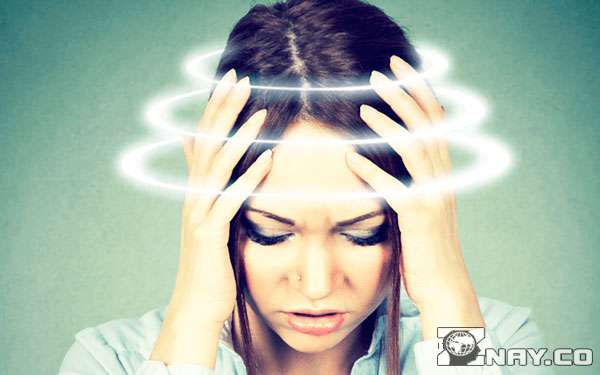
Diagnostics
To determine the reasons why you feel dizzy while lying down, it is necessary to undergo a complete diagnosis of the body. To make a diagnosis, the doctor will ask a number of questions:
- At what time do dizziness begin?
- Is dizziness accompanied by nausea, vomiting, or fainting?
- How often do you feel dizzy?
- How long does dizziness last when lying down?
- Are there additional symptoms?
- Does discomfort increase with changes in body position?
- In what position do you feel dizziness more clearly when lying down?
Information received from the patient is not always enough to identify the causes. It is especially difficult to understand that the problem is related to the inner ear. To eliminate the possibility of error, the doctor prescribes a full examination, which includes:
- Magnetic tomography of the neck;
- X-ray of the spine to exclude osteochondrosis;
- Tomography of the heart and blood vessels;
- Ultrasound examination of blood vessels.

The patient will also have to pass a list of tests, after which treatment will be selected.
The treatment method directly depends on the cause of the disease identified by the doctor. Medicines are also prescribed exclusively by a specialist. In any case, it is necessary to eliminate the root cause. To do this they can practice:
- Physical therapy and gymnastics;
- Acupuncture or reflexology;
- Physiotherapy;
- Manual therapy.
Among medications, doctors prefer vasodilators. They restore blood circulation and quickly relieve dizziness. Nootropics also quickly cope with circulatory problems. Vitamin preparations are also widely used when feeling very dizzy. Such medications have a positive effect on the central nervous system.
The following tablets will help eliminate the discomfort of dizziness when lying down:
- “Glycine” is a medicine that improves the functioning of the nervous system. The affordable cost of the drug makes it almost irreplaceable.
- Vinpocetine ensures blood flow to the brain and nutrition of the body's cells.
- Cinnarizine is used for dizziness caused by blood pressure problems. A week of use is enough to get rid of the disease.
- Metoclapromide will help get rid of nausea and vomiting in a short time.
- "Betahistine hydrochloride" is not addictive and is suitable for long-term use. It perfectly relieves dizziness, normalizes blood pressure and relieves some of the stress on the heart muscle.
If a child experiences dizziness while lying down, you can use Cogitum solution. The medicine not only quickly relieves unpleasant symptoms, but is also approved for use in the treatment of children.
Symptoms to watch out for
Many people simply do not pay attention to vertigo. People take it as a consequence of overwork or lack of sleep. But in combination with other types of ailments, it can sometimes indicate an imminent stroke .
Its harbingers are:
- Dizziness;
- Sudden high intensity migraine;
- General weakness for no apparent reason;
- Hiccups;
- Nausea.
By consulting a doctor in time, you can avoid a stroke and its terrible consequences. It is best to do this if similar symptoms have recurred twice already.

Doctor visit
When visiting a doctor, it is of great importance to correctly describe your feelings.
7 reasons for dizziness and nausea in the morning
- Natalia Sergeevna Pershina
- June 9, 2020
To make an accurate diagnosis, the specialist must report symptoms such as:
- injury .
- Headache .
- Heat .
- Pain in the neck.
- Blurred vision.
- loss .
- Problems with speech (not previously apparent).
- Numbness of the limbs.
- Loss of consciousness (after dizziness).
- pain .
- Continuous nausea or vomiting.
No reason to worry
Dizziness can be a common reaction to external factors. With this phenomenon, the body seems to tell a person that he should rest.
Nervous tension is observed in drivers who are forced to spend a long time behind the wheel and be attentive. In this case, migraines and dizziness occur.
Nervous exhaustion is caused by constant lack of sleep, stressful situations, and the need to perform intense mental work. Therefore, it is not surprising that some people begin to feel dizzy at the end of the working day. Doctors also noticed an interesting feature of the body. If a person rests for a long time and then suddenly begins to engage in physical work, he may experience dizziness.
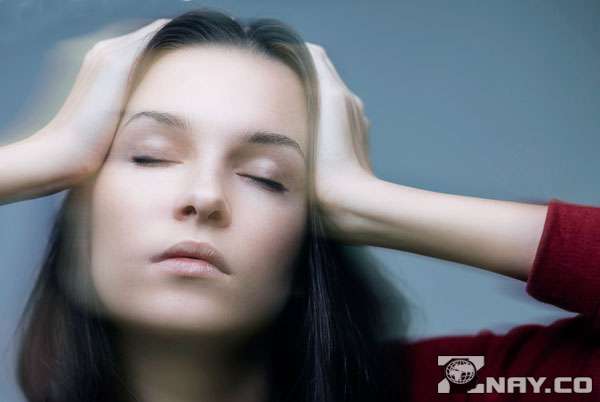
How to make a diagnosis?
The doctor, interviewing the patient regarding the factors that cause dizziness, will ask questions of the following nature:
- the symptoms and frequency of their occurrence chaotic or regular?
- what actions lead to dizziness;
- How long does dizziness last, what sensations occur during this?
- factors that could predispose to the appearance of dizziness (infections, injuries, hypertension, heart problems, diseases of the nervous system, stress, the results of a drug overdose, toxins, drugs, alcohol);
- the development of dizziness by a disease that was acquired by a person sexually cannot be ruled out
- possible consequences of dizziness (impaired coordination, slurred speech, memory loss, paralysis of the patient’s limbs).
There are a huge number of reasons that lead to such an undesirable phenomenon as dizziness. Sometimes it is quite difficult for a doctor to make a definite diagnosis. Sometimes an illness can be caused solely by external factors, such as the patient’s place of work or home. In addition to the survey, X-rays, MRIs, and tests are used that can more accurately help establish a diagnosis.
Dizziness when lying horizontally
It would seem that in a calm state a person should not be bothered by dizziness. But it can overtake him even when he is just resting on the bed or sofa. This is most often encountered by old people who have developed atherosclerotic plaques in their vessels, and women during menopause.
People suffering from panic attacks may suddenly feel dizzy when they are at rest. At the same time, they feel hot, a feeling of fear appears, etc. If this happens frequently, then you may need the help of two specialists at once: a psychiatrist and a neurologist.
It turns out that dizziness after turning the head is a symptom of many diseases, but most often the cause is cervical osteochondrosis . Although sometimes this is simply a consequence of pinching the cervical artery due to a sudden movement. If a person is often bothered by vertigo, accompanied by nausea and migraines, then this is a reason to make an appointment with a neurologist.

Is it a false alarm?
Many people feel dizzy when turning, their vision becomes dark and there is a slight feeling of nausea. The cause of this condition can be a number of factors, the main one of which is a disruption in the functioning of the vestibular apparatus. This:
- long ride on a swing;
- long car trips;
- performing exercises where you have to make sudden movements with the whole body, its upper part or head, etc.;
- recent drinking;
- systematic lack of sleep and physical fatigue;
- a sharp transition from a state of calm to physical activity.
A less common cause is cerebral vascular spasm due to the release of increased doses of the hormone adrenaline at critical moments for life and health.
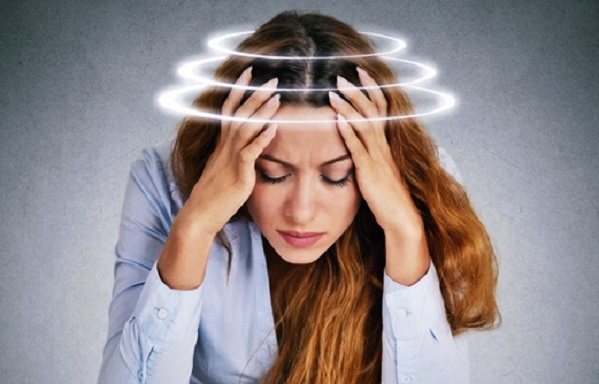
In most cases, this condition goes away without any outside intervention. These are so-called non-systemic dizziness. And when a sudden movement of the head constantly causes a feeling of clouding of consciousness, a slight sensation that objects around are floating or moving, one should think about it, especially if dizziness occurs when turning the head in a lying position. You should not panic, but it is advisable to visit a neuropathologist in order to be checked for the presence of viral diseases or their carriers, the initial stages of neuritis.
Let's look at the main symptoms of dizziness during sleep and while awake at any time of the day and the nature of its occurrence.
BPPV as a disease factor
The abbreviation BPPV stands for benign paroxysmal positional vertigo; this disease is diagnosed in 75% of patients who come to the hospital with the problem of dizziness. More than 80% of patients with this diagnosis have a benign prognosis.
The disease responds well to drug treatment, with a positive prognosis for recovery.
The most characteristic feature of BPPV is:
- Manifestation of the disease at a certain position of the patient’s body. Most often, the disease manifests itself when the head is tilted or turned, sometimes when the patient is lying on the bed.
- A peculiarity of the course of the disease is the absence of headaches, as well as the exact duration of the attack, which can last from 5 minutes to an hour.
How to treat?
Treatment of dizziness responds well to various medications, the most common treatments are:
- The use of drugs that should quickly relieve stress and help the body relax, seduxin or andaxin is used;
- Establishing an accurate diagnosis and the root cause of dizziness will allow the use of comprehensive treatment;
- The most commonly used are antihistamines, tranquilizers, and anti-nausea medications.
- In addition, various herbal remedies and ointments are widely used that can relieve inflammation of osteochondrosis in order to neutralize the restriction of blood supply. Ointments based on snake venom, bee honey or tinctures of various medicinal herbs are used.
